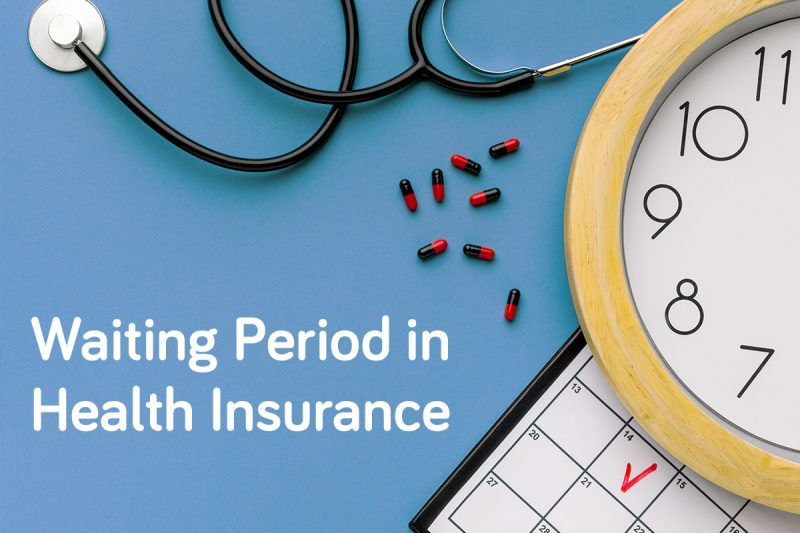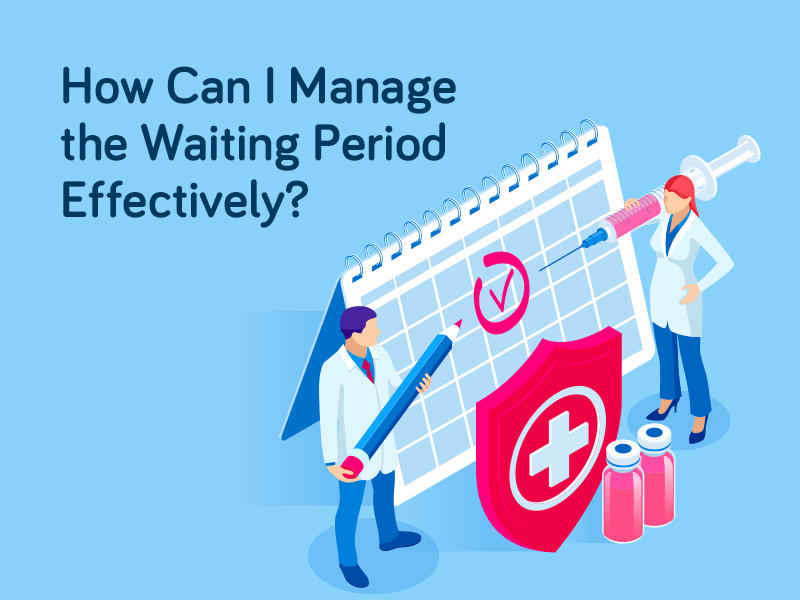Health Insurance Waiting Period:
All You Need To Know

Health insurance is like a trusted friend on your path to well-being, providing security and confidence as you navigate the complexities of healthcare for yourself and your loved ones. However, before it can offer you and your loved ones comprehensive support, it’s essential to grasp a fundamental aspect – the waiting period.
Picture it as a securely locked door, ensuring your safety. You must patiently await its opening to attain complete protection. In this blog, we will dig deeper into the intricacies of the “waiting period” to thoroughly understand its components and significance.
What Is A Waiting Period In Health Insurance?
The waiting period in health insurance signifies a predetermined span during which certain aspects of your policy’s benefits or coverage are either restricted or unavailable. Typically, insurance providers define this time frame, and its duration can vary among policies.
Understanding the intricacies of waiting period clauses within your health insurance policy is paramount since they wield significant influence over your healthcare coverage. These provisions can impact the timing and conditions under which you can utilize your insurance for different medical services. Thus, policyholders need to be well-versed and ready for potential delays or limitations in accessing the complete spectrum of benefits their policy offers. Being informed ensures a smoother healthcare journey.
Types Of Health Insurance Waiting Periods
Health insurance policies have several waiting periods, each serving a distinct purpose. Let’s delve into these waiting periods to gain a comprehensive understanding:
Initial Waiting Period:
After obtaining a health insurance policy, policyholders must observe an initial waiting period, also known as a cooling period, before they can make any claims. Standard practice in the health insurance industry dictates an initial waiting period of at least 1 month and a maximum of 90 days. The sole exception to this rule is for accidental claims, which are processed immediately when the insured faces an accident necessitating hospitalization. It’s crucial to note that the initial waiting period can vary among insurers.
Pre-Existing Diseases (PED) Waiting Period:
There is a specific waiting period for ailments disclosed by the policyholder at the time of policy purchase, commonly referred to as pre-existing diseases. According to the Insurance Regulatory and Development Authority of India (IRDAI), pre-existing diseases encompass conditions, injuries, ailments, or diseases diagnosed up to 48 months before policy acquisition. The waiting period for pre-existing diseases in health insurance policies typically ranges from 1 to 4 years. Nevertheless, this waiting period depends on the insured’s health condition and the chosen health insurance plan.
Waiting Period for Specific Diseases:
Certain diseases, such as hernia, tumours, ENT disorders, cancer, stroke, and cardiac ailments, entail a unique waiting period. Typically, the waiting period for these conditions varies between 2 and 4 years. The specific ailments covered under this waiting period differ between insurers and can be found in the policy’s terms and conditions.
Maternity Waiting Period:
Health insurance plans designed for individuals and families often include maternity and newborn baby coverage as an optional add-on. This benefit becomes accessible after completing a waiting period, which usually ranges from 2 to 4 years. Some insurers offer shorter waiting periods but require policyholders to pay additional premiums.
Waiting Period for Bariatric Surgery:
Specific health insurance policies extend coverage to bariatric surgery, a procedure that addresses severe obesity-related issues involving the stomach and intestines. This surgery is typically recommended for individuals with a BMI over 40 who are experiencing health complications due to obesity.
Waiting Period for Coronavirus:
Considering the impact of COVID-19, many individuals have chosen to enroll in coronavirus-specific health insurance plans. To access coverage benefits like hospitalization and treatment under these plans, policyholders are typically required to fulfill a waiting period, which may extend up to 30 days.
Understanding these various waiting periods is crucial when selecting a health insurance policy, as it allows policyholders to make informed decisions that align with their unique healthcare needs and circumstances.

Why Do Health Insurance Waiting Periods Exist?
Waiting periods in health insurance fulfill several vital functions, which play a crucial role in maintaining the stability and sustainability of the insurance industry:
Risk Mitigation:
Waiting periods are an effective risk management tool for insurance companies. They are put in place to prevent individuals from acquiring a health insurance policy only when they urgently need medical attention. Without waiting periods, individuals could exploit the system by purchasing insurance just before undergoing costly medical procedures. This would result in higher claim payouts and increased premiums for all policyholders. By imposing waiting periods, insurers ensure that policyholders genuinely intend to maintain coverage over the long term rather than using insurance solely for immediate financial gain.
Cost Management:
Waiting periods are a cost-management tool in health insurance. Without waiting periods, people might strategically buy policies right before planned medical procedures, shifting costs onto the insurer and raising insurance costs for everyone. Waiting periods prevent this and help keep premiums stable for policyholders.
Encourages Long-term Coverage:
Waiting periods encourage individuals to view health insurance as a long-term commitment rather than a short-term solution. Knowing that they won’t be able to make immediate claims after purchasing a policy motivates individuals to maintain continuous coverage over an extended period. This, in turn, ensures that they have access to comprehensive healthcare benefits when needed, fostering a healthier and more secure population.
The waiting period in health insurance signifies a predetermined span during which certain aspects of your policy’s benefits or coverage are restricted or unavailable. Typically, insurance providers define this time frame, and its duration can vary among policies.
Understanding the intricacies of waiting period clauses within your health insurance policy is paramount since they wield significant influence over your healthcare coverage. These provisions can impact the timing and conditions under which you can utilize your insurance for different medical services. Thus, policyholders need to be well-versed and ready for potential delays or limitations in accessing the complete spectrum of benefits their policy offers. Being informed ensures a smoother healthcare journey.
The waiting period strikes a delicate balance between safeguarding against misuse, controlling costs, and promoting long-term coverage commitment. Ultimately, this equilibrium benefits both insurers and policyholders, ensuring the continued availability and affordability of comprehensive health insurance options.
How Can I Manage the Waiting Period Effectively?
Effectively handling the waiting period in your health insurance policy is essential for maximizing its advantages. To assist you in navigating this period and making informed choices, here are some practical tips to consider:
Plan Ahead:
Planning ahead is advisable if you have pre-existing health conditions or anticipate specific medical needs. Look for a health insurance policy offering shorter waiting periods for those conditions. This proactive approach ensures that you can access coverage sooner when needed.
Read the Fine Print:
Thoroughly review your policy document to understand the waiting periods associated with various medical conditions. Pay attention to the specifics and definitions outlined in the policy. If you encounter any ambiguity or have questions, don’t hesitate to seek clarification from your insurance provider. A comprehensive understanding of your policy is crucial for making informed decisions.
Maintain Continuous Coverage:
To ensure you have uninterrupted access to healthcare coverage, make it a priority to renew your policy on time. Maintaining continuous coverage protects you in the event of unforeseen medical expenses and prevents resetting waiting periods, which can occur if there is a coverage gap.
Consider Family Coverage:
If you plan to start a family or expand your current one, pay attention to policies offering shorter maternity waiting periods. Maternity coverage is essential during this life-changing period, and selecting a policy with favourable waiting periods can provide financial relief when needed.
Supplement with Riders:
Some insurance providers offer riders or add-on options that can help reduce waiting periods or extend coverage for specific conditions. Explore these rider options to enhance your policy’s flexibility and breadth of protection. Riders can be a valuable addition, especially if you have unique healthcare needs or concerns.
In conclusion, understanding and effectively managing waiting periods in your health insurance policy is essential for optimizing its benefits. By planning, reviewing policy details, maintaining continuous coverage, considering family needs, and exploring rider options, you can make informed choices that align with your healthcare requirements and financial well-being.
Understanding health insurance waiting periods is vital. Various waiting periods can affect your coverage. By becoming familiar with them, understanding their purpose, and knowing how to navigate them, you can make more informed decisions when choosing and using your health insurance.
CarePal Secure offers a unique zero-waiting period feature for certain plans, ensuring immediate coverage for specific treatments. Opt for comprehensive coverage and enjoy peace of mind from day one.
When assessing health insurance options in the future, always keep the waiting period in mind as a crucial factor in securing your future healthcare needs.
Frequently Asked Questions
Good digestion ensures proper nutrient absorption, strengthens immunity, and boosts energy levels. It also prevents complications like weight gain, hormonal imbalances, and chronic diseases.
Consider the insurer’s financial stability, claims process, coverage terms, and inclusion of services like teleconsultation and diagnostic tests. These factors ensure smooth access to care and timely claim settlements.
Poor digestion can cause nutrient deficiencies, weakening the immune system and leading to fatigue. It’s also linked to weight gain, diabetes, and mental health issues.
Adopt a balanced diet rich in fiber and fermented foods, quit smoking, avoid alcohol, exercise regularly, and manage stress to support healthy digestion.
It offers comprehensive benefits, including hospitalization, diagnostic tests, and teleconsultation, with a reduced waiting period for pre-existing conditions and cashless treatments.
Hi, my name is Om, and I am a developer at Carepal Secure. With a strong passion for technology and innovation, I enjoy creating effective solutions and learning new skills to enhance my expertise. My journey in development has been both challenging and rewarding, allowing me to grow professionally while contributing meaningfully to the projects I work on.












